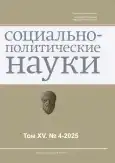Social responsibility and the brand of a State University: new approaches to positioning
- Authors: Nasyrova E.V.1
-
Affiliations:
- Russian State University for the Humanities
- Issue: Vol 15, No 4 (2025)
- Pages: 106-116
- Section: Political Institutions, Processes and Technologies
- URL: https://journal-vniispk.ru/2223-0092/article/view/348439
- DOI: https://doi.org/10.33693/2223-0092-2025-15-4-106-116
- EDN: https://elibrary.ru/YFOEJS
- ID: 348439
Cite item
Abstract
This article explores approaches to building a university brand in the context of strategic positioning in higher education. The author examine’s three dominant brand strategies used by universities worldwide: mission-driven, product-driven, and consumer-driven. Through a comparative analysis of leading Russian (MGIMO, MSU) and international universities (MIT, Harvard, Princeton, Yale), the paper highlights the unique identity formation processes of academic institutions based on their mission, research output, and engagement with stakeholders. The authors further apply a market-based brand classification model – including Leadership, Challenger, Differentiation, Niche, and Follower strategies – derived from Gilligan & Wilson’s marketing framework. Using the case of the Russian State University for the Humanities (RSUH), the authors propose a step-by-step algorithm for developing a university positioning concept. The algorithm integrates the analysis of the university’s educational, research, and innovation models, corporate culture, and academic reputation. Based on this assessment, the Differentiation strategy is identified as optimal for RSUH, taking into account the university’s diverse educational portfolio and its humanities-focused identity. The article also presents methods for communicating the brand to key stakeholders through the Hero–Hub–Hygiene content model and an inverted funnel approach – both aimed at enhancing student experience and generating organic brand advocacy. The study concludes that in a competitive educational market, effective brand formation requires a coherent strategy rooted in the institution’s mission, supported by measurable strengths, and communicated through emotionally resonant and evidence-based messaging. The authors argue that positioning a university not simply as a provider of education but as a visionary institution addressing future societal challenges is crucial for long-term relevance and differentiation.
Keywords
Full Text
##article.viewOnOriginalSite##About the authors
Elena V. Nasyrova
Russian State University for the Humanities
Author for correspondence.
Email: nasyrova.ev@rggu.ru
ORCID iD: 0009-0007-6788-6693
SPIN-code: 2286-5490
Cand. Sci. (Polit.), associate professor, Department of Integrated Communications and Advertising
Russian Federation, MoscowReferences
- Abaev A.L., Nasyrova E.V. Positioning of the University in the Modern Educational Space. National Interests: Priorities and Security. 2025. No. 4. Pp. 4–16. (In Rus.)
- Altbach P. Global Perspectives on Higher Education. Moscow: Publishing House of HSE, 2018.
- Wissema J. The third generation university. Managing the university in a transitional period. Moscow: Olimp-Business, 2016. 481 p.
- Accelerated universities. P. Altbach, L. Reisberg, D. Salmi, I. Frumin (eds.). Moscow: Publishing House of HSE, 2022.
- Lewis E.St.-E. The financial advertiser. The Inland Printer. 1888–1889. Vol. 7. No. 3.
- Kotler Ph., Fox K. Strategic marketing for educational institutions. New Jersey: Prentice-Hall, 1995. 474 p. 329 с.
- Gilligan C., Wilson R.M.S. Strategic marketing planning. Routledge, 2009. 550 p.
Supplementary files












